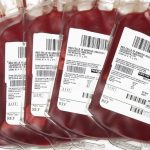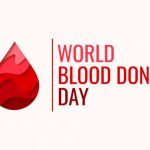A Senior Registrar at the University of Ilorin Teaching Hospital (UITH), Dr. Abimbola Aboluwarin, made a heartfelt appeal to Nigerians on Wednesday, urging them to consider voluntary blood donation as a means of saving lives.
Speaking to reporters in Ilorin during the commemoration of the 2023 World Donor Day, Dr. Aboluwarin emphasised the critical importance of donating blood and plasma, and encouraged Nigerians to make it a regular habit.
The theme for this year’s World Donor Day is “Give Blood, Give Plasma, Share Life, Share Often,” and Dr. Aboluwarin stressed the significance of this message.
By donating blood and plasma, individuals can make a significant impact on the lives of those in need, particularly in emergency situations where time is of the essence.
The expert explained that the importance of the day focuses on patients requiring life-long transfusion support, adding that this underlines the role every single person can play. She stated that this was by giving the valuable gift of blood or plasma regularly to create a safe and sustainable supply of products that could always be available all over the world, so that all patients in need could receive timely treatment.
Aboluwarin observed that Nigeria had one of the lowest voluntary blood donation rates globally, with only 10 per cent of blood supply coming from voluntary donors.
“Nigeria requires a minimum of 1.8 million units of blood per year to meet the blood transfusion need of its citizens.
“However, only 500,000 units of blood are realised which is short of the required need,” she said.
Aboluwarin pointed out that blood transfusion was a crucial aspect of healthcare services, particularly in emergency situations and during medical procedures like surgeries. “Blood donation doesn’t cause shortcomings and adults in good health replenish their red blood cells three to four weeks after donation,” she said.
The expert also said those who donate blood are usually tested and certified to be healthy and disease-free, while pregnant women were exempted. She debunked some misinformation that healthcare workers sell blood, while reiterating that they always discourage selling of blood.
The expert urged people to visit the Haematology department of UITH or General Hospital, Ilorin, to donate blood, adding that it could save lives of people.
A Senior Registrar at the University of Ilorin Teaching Hospital (UITH), Dr. Abimbola Aboluwarin, made a heartfelt appeal to Nigerians on Wednesday, urging them to consider voluntary blood donation as a means of saving lives.
Speaking to reporters in Ilorin during the commemoration of the 2023 World Donor Day, Dr. Aboluwarin emphasised the critical importance of donating blood and plasma, and encouraged Nigerians to make it a regular habit.
The theme for this year’s World Donor Day is “Give Blood, Give Plasma, Share Life, Share Often,” and Dr. Aboluwarin stressed the significance of this message.
By donating blood and plasma, individuals can make a significant impact on the lives of those in need, particularly in emergency situations where time is of the essence.
The expert explained that the importance of the day focuses on patients requiring life-long transfusion support, adding that this underlines the role every single person can play. She stated that this was by giving the valuable gift of blood or plasma regularly to create a safe and sustainable supply of products that could always be available all over the world, so that all patients in need could receive timely treatment.
Aboluwarin observed that Nigeria had one of the lowest voluntary blood donation rates globally, with only 10 per cent of blood supply coming from voluntary donors.
“Nigeria requires a minimum of 1.8 million units of blood per year to meet the blood transfusion need of its citizens.
“However, only 500,000 units of blood are realised which is short of the required need,” she said.
Aboluwarin pointed out that blood transfusion was a crucial aspect of healthcare services, particularly in emergency situations and during medical procedures like surgeries. “Blood donation doesn’t cause shortcomings and adults in good health replenish their red blood cells three to four weeks after donation,” she said.
The expert also said those who donate blood are usually tested and certified to be healthy and disease-free, while pregnant women were exempted. She debunked some misinformation that healthcare workers sell blood, while reiterating that they always discourage selling of blood.
The expert urged people to visit the Haematology department of UITH or General Hospital, Ilorin, to donate blood, adding that it could save lives of people.
A Senior Registrar at the University of Ilorin Teaching Hospital (UITH), Dr. Abimbola Aboluwarin, made a heartfelt appeal to Nigerians on Wednesday, urging them to consider voluntary blood donation as a means of saving lives.
Speaking to reporters in Ilorin during the commemoration of the 2023 World Donor Day, Dr. Aboluwarin emphasised the critical importance of donating blood and plasma, and encouraged Nigerians to make it a regular habit.
The theme for this year’s World Donor Day is “Give Blood, Give Plasma, Share Life, Share Often,” and Dr. Aboluwarin stressed the significance of this message.
By donating blood and plasma, individuals can make a significant impact on the lives of those in need, particularly in emergency situations where time is of the essence.
The expert explained that the importance of the day focuses on patients requiring life-long transfusion support, adding that this underlines the role every single person can play. She stated that this was by giving the valuable gift of blood or plasma regularly to create a safe and sustainable supply of products that could always be available all over the world, so that all patients in need could receive timely treatment.
Aboluwarin observed that Nigeria had one of the lowest voluntary blood donation rates globally, with only 10 per cent of blood supply coming from voluntary donors.
“Nigeria requires a minimum of 1.8 million units of blood per year to meet the blood transfusion need of its citizens.
“However, only 500,000 units of blood are realised which is short of the required need,” she said.
Aboluwarin pointed out that blood transfusion was a crucial aspect of healthcare services, particularly in emergency situations and during medical procedures like surgeries. “Blood donation doesn’t cause shortcomings and adults in good health replenish their red blood cells three to four weeks after donation,” she said.
The expert also said those who donate blood are usually tested and certified to be healthy and disease-free, while pregnant women were exempted. She debunked some misinformation that healthcare workers sell blood, while reiterating that they always discourage selling of blood.
The expert urged people to visit the Haematology department of UITH or General Hospital, Ilorin, to donate blood, adding that it could save lives of people.
A Senior Registrar at the University of Ilorin Teaching Hospital (UITH), Dr. Abimbola Aboluwarin, made a heartfelt appeal to Nigerians on Wednesday, urging them to consider voluntary blood donation as a means of saving lives.
Speaking to reporters in Ilorin during the commemoration of the 2023 World Donor Day, Dr. Aboluwarin emphasised the critical importance of donating blood and plasma, and encouraged Nigerians to make it a regular habit.
The theme for this year’s World Donor Day is “Give Blood, Give Plasma, Share Life, Share Often,” and Dr. Aboluwarin stressed the significance of this message.
By donating blood and plasma, individuals can make a significant impact on the lives of those in need, particularly in emergency situations where time is of the essence.
The expert explained that the importance of the day focuses on patients requiring life-long transfusion support, adding that this underlines the role every single person can play. She stated that this was by giving the valuable gift of blood or plasma regularly to create a safe and sustainable supply of products that could always be available all over the world, so that all patients in need could receive timely treatment.
Aboluwarin observed that Nigeria had one of the lowest voluntary blood donation rates globally, with only 10 per cent of blood supply coming from voluntary donors.
“Nigeria requires a minimum of 1.8 million units of blood per year to meet the blood transfusion need of its citizens.
“However, only 500,000 units of blood are realised which is short of the required need,” she said.
Aboluwarin pointed out that blood transfusion was a crucial aspect of healthcare services, particularly in emergency situations and during medical procedures like surgeries. “Blood donation doesn’t cause shortcomings and adults in good health replenish their red blood cells three to four weeks after donation,” she said.
The expert also said those who donate blood are usually tested and certified to be healthy and disease-free, while pregnant women were exempted. She debunked some misinformation that healthcare workers sell blood, while reiterating that they always discourage selling of blood.
The expert urged people to visit the Haematology department of UITH or General Hospital, Ilorin, to donate blood, adding that it could save lives of people.
A Senior Registrar at the University of Ilorin Teaching Hospital (UITH), Dr. Abimbola Aboluwarin, made a heartfelt appeal to Nigerians on Wednesday, urging them to consider voluntary blood donation as a means of saving lives.
Speaking to reporters in Ilorin during the commemoration of the 2023 World Donor Day, Dr. Aboluwarin emphasised the critical importance of donating blood and plasma, and encouraged Nigerians to make it a regular habit.
The theme for this year’s World Donor Day is “Give Blood, Give Plasma, Share Life, Share Often,” and Dr. Aboluwarin stressed the significance of this message.
By donating blood and plasma, individuals can make a significant impact on the lives of those in need, particularly in emergency situations where time is of the essence.
The expert explained that the importance of the day focuses on patients requiring life-long transfusion support, adding that this underlines the role every single person can play. She stated that this was by giving the valuable gift of blood or plasma regularly to create a safe and sustainable supply of products that could always be available all over the world, so that all patients in need could receive timely treatment.
Aboluwarin observed that Nigeria had one of the lowest voluntary blood donation rates globally, with only 10 per cent of blood supply coming from voluntary donors.
“Nigeria requires a minimum of 1.8 million units of blood per year to meet the blood transfusion need of its citizens.
“However, only 500,000 units of blood are realised which is short of the required need,” she said.
Aboluwarin pointed out that blood transfusion was a crucial aspect of healthcare services, particularly in emergency situations and during medical procedures like surgeries. “Blood donation doesn’t cause shortcomings and adults in good health replenish their red blood cells three to four weeks after donation,” she said.
The expert also said those who donate blood are usually tested and certified to be healthy and disease-free, while pregnant women were exempted. She debunked some misinformation that healthcare workers sell blood, while reiterating that they always discourage selling of blood.
The expert urged people to visit the Haematology department of UITH or General Hospital, Ilorin, to donate blood, adding that it could save lives of people.
A Senior Registrar at the University of Ilorin Teaching Hospital (UITH), Dr. Abimbola Aboluwarin, made a heartfelt appeal to Nigerians on Wednesday, urging them to consider voluntary blood donation as a means of saving lives.
Speaking to reporters in Ilorin during the commemoration of the 2023 World Donor Day, Dr. Aboluwarin emphasised the critical importance of donating blood and plasma, and encouraged Nigerians to make it a regular habit.
The theme for this year’s World Donor Day is “Give Blood, Give Plasma, Share Life, Share Often,” and Dr. Aboluwarin stressed the significance of this message.
By donating blood and plasma, individuals can make a significant impact on the lives of those in need, particularly in emergency situations where time is of the essence.
The expert explained that the importance of the day focuses on patients requiring life-long transfusion support, adding that this underlines the role every single person can play. She stated that this was by giving the valuable gift of blood or plasma regularly to create a safe and sustainable supply of products that could always be available all over the world, so that all patients in need could receive timely treatment.
Aboluwarin observed that Nigeria had one of the lowest voluntary blood donation rates globally, with only 10 per cent of blood supply coming from voluntary donors.
“Nigeria requires a minimum of 1.8 million units of blood per year to meet the blood transfusion need of its citizens.
“However, only 500,000 units of blood are realised which is short of the required need,” she said.
Aboluwarin pointed out that blood transfusion was a crucial aspect of healthcare services, particularly in emergency situations and during medical procedures like surgeries. “Blood donation doesn’t cause shortcomings and adults in good health replenish their red blood cells three to four weeks after donation,” she said.
The expert also said those who donate blood are usually tested and certified to be healthy and disease-free, while pregnant women were exempted. She debunked some misinformation that healthcare workers sell blood, while reiterating that they always discourage selling of blood.
The expert urged people to visit the Haematology department of UITH or General Hospital, Ilorin, to donate blood, adding that it could save lives of people.
A Senior Registrar at the University of Ilorin Teaching Hospital (UITH), Dr. Abimbola Aboluwarin, made a heartfelt appeal to Nigerians on Wednesday, urging them to consider voluntary blood donation as a means of saving lives.
Speaking to reporters in Ilorin during the commemoration of the 2023 World Donor Day, Dr. Aboluwarin emphasised the critical importance of donating blood and plasma, and encouraged Nigerians to make it a regular habit.
The theme for this year’s World Donor Day is “Give Blood, Give Plasma, Share Life, Share Often,” and Dr. Aboluwarin stressed the significance of this message.
By donating blood and plasma, individuals can make a significant impact on the lives of those in need, particularly in emergency situations where time is of the essence.
The expert explained that the importance of the day focuses on patients requiring life-long transfusion support, adding that this underlines the role every single person can play. She stated that this was by giving the valuable gift of blood or plasma regularly to create a safe and sustainable supply of products that could always be available all over the world, so that all patients in need could receive timely treatment.
Aboluwarin observed that Nigeria had one of the lowest voluntary blood donation rates globally, with only 10 per cent of blood supply coming from voluntary donors.
“Nigeria requires a minimum of 1.8 million units of blood per year to meet the blood transfusion need of its citizens.
“However, only 500,000 units of blood are realised which is short of the required need,” she said.
Aboluwarin pointed out that blood transfusion was a crucial aspect of healthcare services, particularly in emergency situations and during medical procedures like surgeries. “Blood donation doesn’t cause shortcomings and adults in good health replenish their red blood cells three to four weeks after donation,” she said.
The expert also said those who donate blood are usually tested and certified to be healthy and disease-free, while pregnant women were exempted. She debunked some misinformation that healthcare workers sell blood, while reiterating that they always discourage selling of blood.
The expert urged people to visit the Haematology department of UITH or General Hospital, Ilorin, to donate blood, adding that it could save lives of people.
A Senior Registrar at the University of Ilorin Teaching Hospital (UITH), Dr. Abimbola Aboluwarin, made a heartfelt appeal to Nigerians on Wednesday, urging them to consider voluntary blood donation as a means of saving lives.
Speaking to reporters in Ilorin during the commemoration of the 2023 World Donor Day, Dr. Aboluwarin emphasised the critical importance of donating blood and plasma, and encouraged Nigerians to make it a regular habit.
The theme for this year’s World Donor Day is “Give Blood, Give Plasma, Share Life, Share Often,” and Dr. Aboluwarin stressed the significance of this message.
By donating blood and plasma, individuals can make a significant impact on the lives of those in need, particularly in emergency situations where time is of the essence.
The expert explained that the importance of the day focuses on patients requiring life-long transfusion support, adding that this underlines the role every single person can play. She stated that this was by giving the valuable gift of blood or plasma regularly to create a safe and sustainable supply of products that could always be available all over the world, so that all patients in need could receive timely treatment.
Aboluwarin observed that Nigeria had one of the lowest voluntary blood donation rates globally, with only 10 per cent of blood supply coming from voluntary donors.
“Nigeria requires a minimum of 1.8 million units of blood per year to meet the blood transfusion need of its citizens.
“However, only 500,000 units of blood are realised which is short of the required need,” she said.
Aboluwarin pointed out that blood transfusion was a crucial aspect of healthcare services, particularly in emergency situations and during medical procedures like surgeries. “Blood donation doesn’t cause shortcomings and adults in good health replenish their red blood cells three to four weeks after donation,” she said.
The expert also said those who donate blood are usually tested and certified to be healthy and disease-free, while pregnant women were exempted. She debunked some misinformation that healthcare workers sell blood, while reiterating that they always discourage selling of blood.
The expert urged people to visit the Haematology department of UITH or General Hospital, Ilorin, to donate blood, adding that it could save lives of people.














